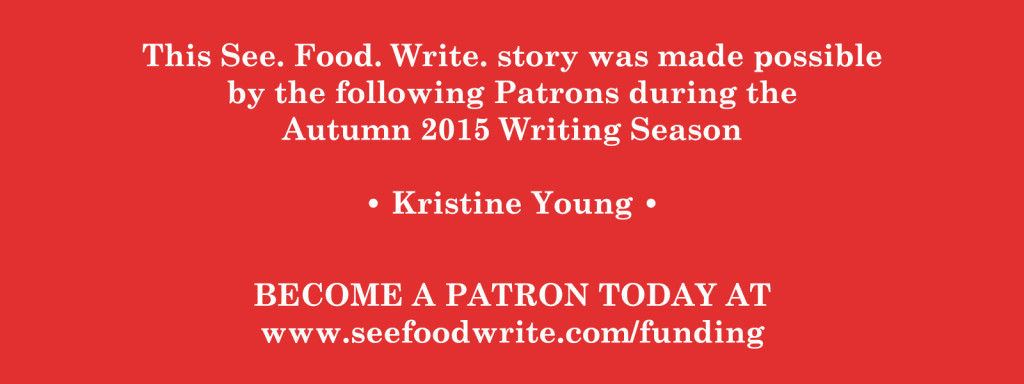Worcester, Massachusetts is a city primed with potential. Its downtown is filled with grand buildings from bygone decades, adorned with ornate, period touches against majestic brick and stone. Yet, many of these gilded storefronts are shuttered. In a busier metropolis, you would find similarly historic high streets crammed with a panoply of pubs, restaurants, and street carts. So it’s even more of a shock when you learn that population-wise, Worcester is the second largest city in New England, after Boston.
But dotted along the main drags of “Woo-stah” — alternatively, Woo-town, The Woo, or Wormtown — are all the elements of an emerging, cultural city.
For sure, there are lush neighborhoods filled with tony New England mansions, and students from no less than 11 colleges and universities fill its seams. When you take a drive or stroll around Worcester, however, you can see the rest of the population peek out. On one street you can find an Irish butcher, a Halal meat grocery, a Kenyan eatery, a Vietnamese cafe, and a Spanish market all within a ten-minute drive; a soul food stop and an Iraqi restaurant are not far away. And Worcester itself has become a placement destination for international refugees negotiated by the U.S. Department of State, including those displaced from Iraq, Bhutan, Burma, Somalia, Liberia, and Syria.
These veins of past and recent immigration are intertwined with all the stresses and successes of an evolving, historic city. Slums of triple-decker apartments where newly arrived refugees live alongside economically struggling Americans. A grand burlesque hall revived as a downtown performing arts center. Gruff drifters and nameless souls forming lines outside a Salvation Army. Aging warehouses and factories transformed into new offices and hipster shops. Anchoring all of this are the city’s remaining lunch car diners — narrow, squat havens of grease and coffee, famously served with attitude and pride.
These are but a few vignettes of Worcester.
* * *
I love the clang and din of bustling lunch counters. Walking past an alternating assortment of bodegas, hair salons, and laundromats, each with their own microcosm of doorstep gatherings, languages, and conversations, I stepped into this busy lunch room called The Pickle Barrel. The bespectacled cashier cast a “hello” my way as he tended to paying customers.
The dining booths were full, but the counter was sparsely seated. I slid onto a stool, and a moment later, a tussle of fading, brunette frizz greeted me with a tanned, buxom smile. She appeared to be in her early 50’s.
“You know whatchea want, or you need a minute?”
“Well, I was thinking of trying the ‘Syrian club grinder’.”
The waitress set one elbow down on the counter, and lowered her voice. “I wouldn’t do it,” she shook her head, and looked back at the prep line, which was buzzing with New England accents and what sounded like Arabic. “They’ve been having trouble with the Syrian bread all morning. We got some nice hot sandwiches here, though.”
I followed her finger as she flipped open the laminated menu towards an inside leaf.
“How’s the souvlaki?”
“It’s good” was a statement accompanied by a firm, trust-me nod.
“Should I get the pork or chicken?”
“Chicken.”
“Oh and I’ll take a cup of the beef soup.”
“You got it.”
Customers walked in and out. A few were greeted by name, echoing as the patron walked further back into the restaurant: Hi Mark. Hey Mark. How ya doing today, Mark?
The beef and vegetable soup materialized almost instantly.
Overhead on the small, wall-mounted T.V., gaudy ladies of some daytime talk show were chattering away. I was savoring the big, meaty chunks of beef and soothing broth when a hand lightly touched my shoulder. It was my waitress.
“You want something to drink?”
That hand, south of a certain geographic parallel, would have been substituted by a “sweetheart” or “sugar” or “hon”. But the meaning was all the same.
I asked for a glass of water.
The wait for my main order wasn’t long, but nevertheless another touch on the shoulder whispered to me that my souvlaki was coming right up. When it arrived, my waitress asked if I wanted a pickle with the meal. I said that’d be great.
The pickle was about the size of my plate.
I started to work on my souvlaki. A large gentleman sat down a seat over from me. His ample presence could be felt, and his form stretched out his t-shirt in rounded heaps. My waitress recognized him, and came over to ask his order.
“Sometimes people show their true colors,” he replied, staring down at the counter. This was not an item on the menu.
The waitress quickly and subtly changed her body language. She had switched into therapist mode.
“What happened,” she looked at him.
He started to speak, but she heard an order come out, and gestured for him to hold the thought. She darted back in place afterwards.
“People show their true colors,” he repeated that phrase, then proceeded to describe his morning. “I got home and she just started yellin’ at me,” he explained. “So I just walked upstairs and went inside.”
“I would’ve done the same too,” the waitress said, and kept listening.
Modesty got better of me, and I turned off my ears to focus on my souvlaki. I wished the tzatziki was a bit more flavorful. The pieces of chicken breast were nicely grilled, and just shy of being dry. The pickle was crisp and not overpowered with vinegar, and would’ve been a meal in itself. Our hostess continued her counseling session, but took care to refill my water glass in between.
My neighbor eventually ordered a sandwich, after unloading his troubles. He sat a bit more upright now.
“See, that’s why I stay single,” the waitress said as she walked out from behind the counter to make her rounds again. “None of that arguin’, yellin’, fightin’ stuff. I’m done with that.”
“Yeah but that’s boring,” my neighbor shouted.
“Oh I get to talk to plenty people here,” she cracked back, barely turning her head.
“That’s not what I’m talkin’ about,” my neighbor replied. He had a grin on his face now.
Somewhere behind our backs, our hostess muttered some unintelligible comeback. The verbal equivalent of an feigned, exasperated headshake. My neighbor let out a laugh, and I couldn’t help but smile, too.
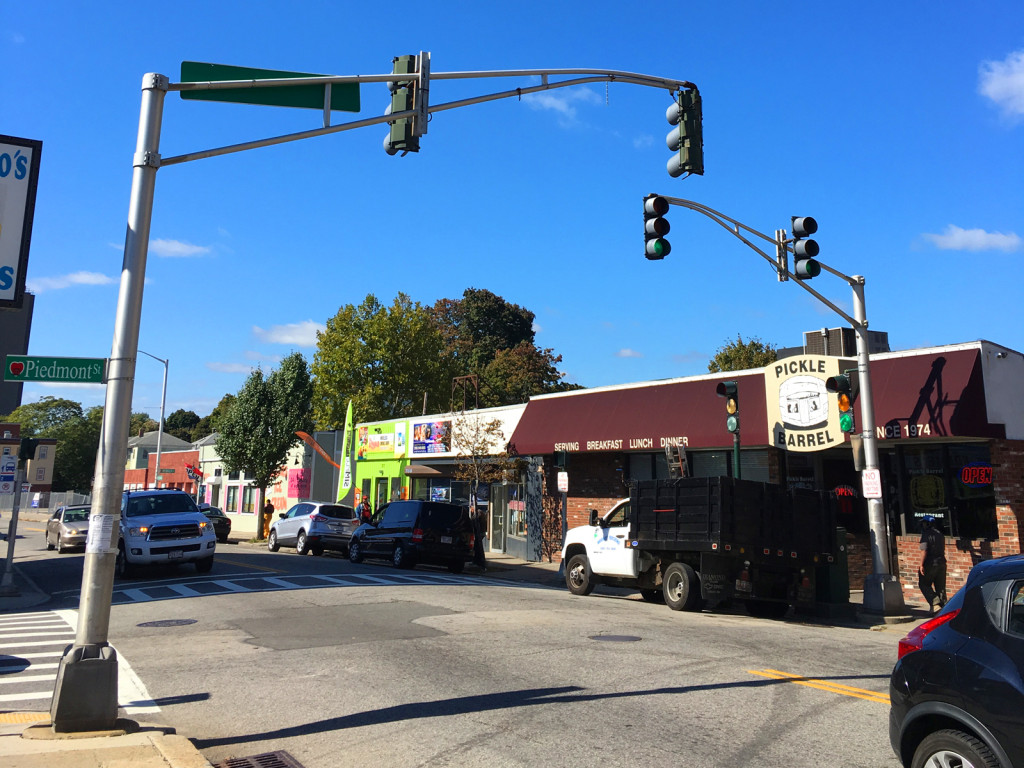
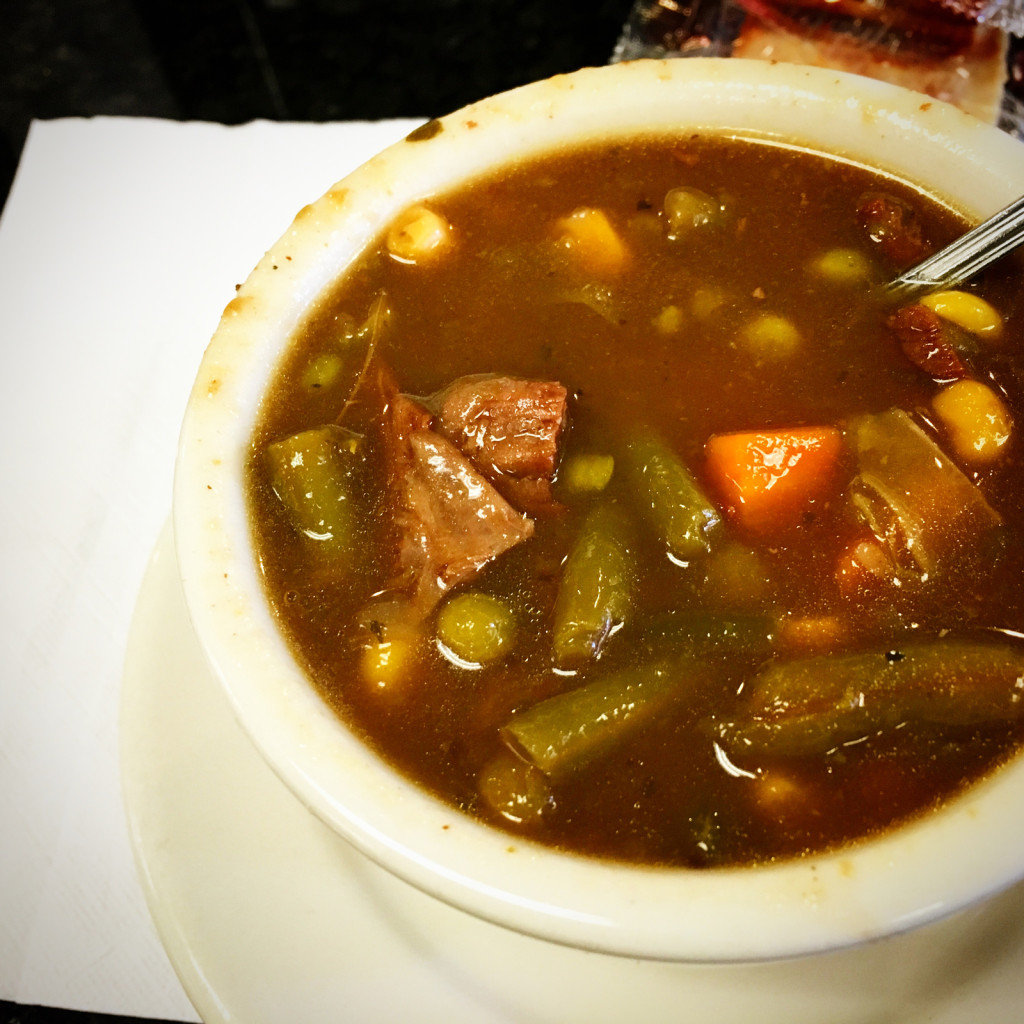
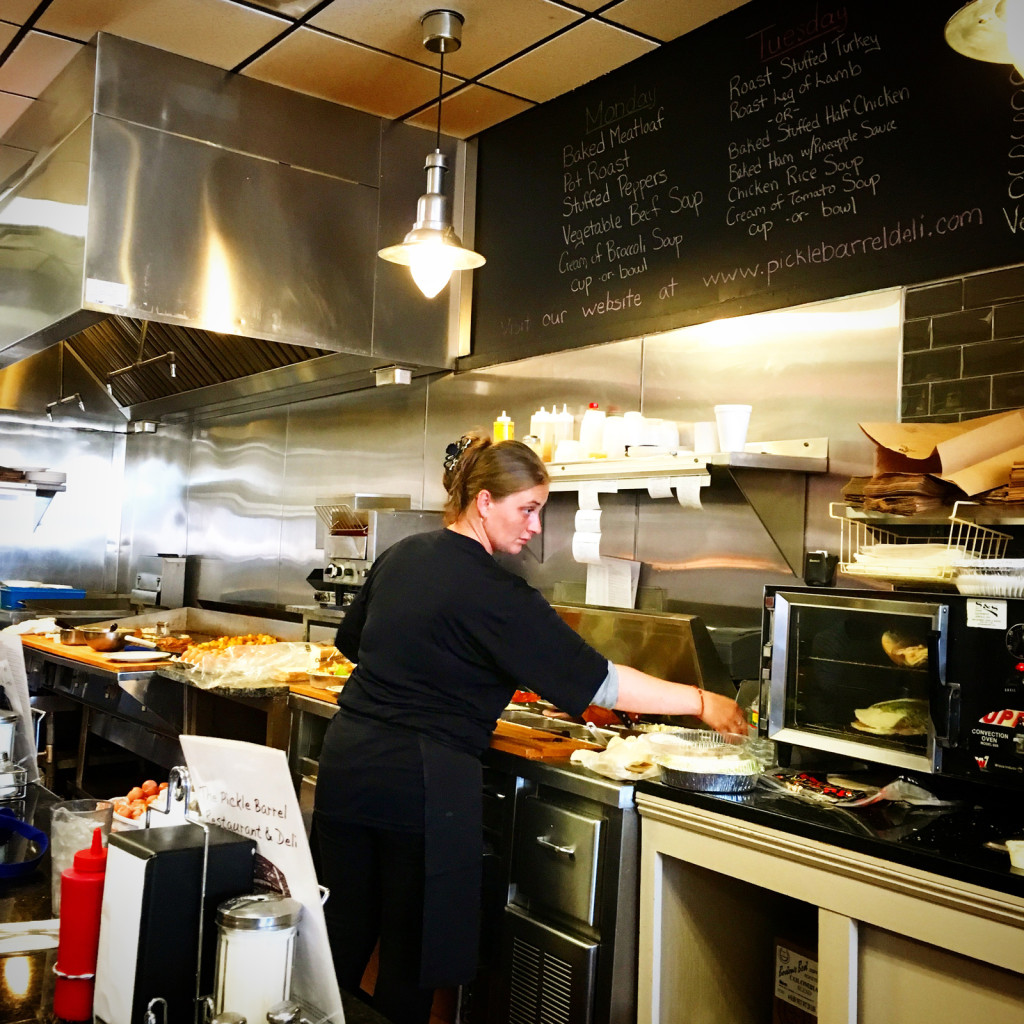
* * *
My dear friends Kyle and Meredith took me out to see Lyle Lovett and John Hiatt perform at the Hanover Theatre for the Performing Arts. It was going to be my first introduction to both singer-songwriters. We thought we’d do the thing right: a dinner before the show. Fortunately, Kyle had a connection with the aptly named Theatre Cafe, having worked part-time there before. We called ahead for a table.
As we walked towards downtown Worcester, the sun was just peeking over the skyline and retreating its fingers from the church steeples and high-rises. The red and green of traffic lights now exuded a soft twinkle.
Arriving at the cafe, we saw that every single table was marked with a reservation sign — names written in colored marker on a piece of colored construction paper. Calling ahead was a wise decision.
The two owners warmly welcomed us; Jeannette worked as the hostess, and Bill as the chef. Barking from the kitchen — which openly faced the dining room — Bill proceeded to give Kyle a mandatory hazing jab. “You’re on dishes tonight,” he said something to that effect. Everyone laughed.
We carefully wiggled into our assigned seats — the cafe maximizes every square foot it has, playing a cozy, elegant game of Tetris with its tables.
This was my second time visiting Kyle and Meredith in Worcester, but the first trip where I had any flexibility and time to really explore the city. I would venture on my own by foot during the day while they were away at work — he a high school teacher, she a nurse practitioner at a community clinic. But in the evenings, I would see Worcester through their lens.
The two of them help lead the Worcester Refugee Assistance Project, which specializes in serving refugees from Burma (Myanmar) and western Thailand, comprising mostly of Karen and Karenni ethnicities displaced by warfare in Burma. Placed in Worcester, the newly arrived are left equally rudderless once federally provided aid ends. To bridge that transition, local volunteers like Meredith and Kyle fill in the gaps, organizing English classes and job application assistance for adults, and after-school programs and weekend field trips for kids. On both visits, I got to shadow Meredith and Kyle on many of these activities, and met many of the faces in Worcester’s Karen and Karenni community.
Immigration is a profoundly American experience, but rarely do any of us witness the process up close — with economic immigration mired in political debates or belittled by racist sentiments, and refugee immigration typically relegated to selective memories from post-World-War eras, romanticized by American movies and documentaries.
The reality is equal parts stark, absurd, and inspiring. Peoples unused to covered footwear, and at home foraging and farming among forests, must now dress for snowbound, New England city streets. Middle-school teens, struggling with their ethnic identity and English ability, must now juggle history homework on the American Revolution while taking on Spanish lessons. Parents sit through community meetings to learn about citizenship classes and health care access, listening to instructions being translated into multiple languages, while their kids trade photos on smartphones and brag about new sneakers in the next room. People get hired, and some get through to college; the laughter of children helps bind everything together.
Even for Kyle and Meredith, taking a night off for a dinner and a show was a rare treat. It was an evening where we could quietly acknowledge the weight and wonder of human lives, and permit food and music to please our senses for a few hours.
One table after another filled up. Guests stating their reservations were quickly greeted and seated — these were seasoned regulars with bottles of wine in hand, remembering that the cafe was B.Y.O.B. — while the few hopeful walk-ins were kindly turned away. Everyone dining here tonight was headed to the show, and this four-person crew — the two owners, the sous, and the runner — had to get us all served and fed by the 7:30 curtain call. The upside was that the Hanover Theatre was no more than two hundred steps away — we could be licking our plates at 7:20, and still have time to walk up to our balcony seats.
We were cleaning up our crab cakes when a middle-aged trio walked in late. There were no tables open, still, but three stools at the high-top bench against the wall were vacant.
Do you have any tables, one of them asked Jeannette. She said they could have the bench if they didn’t mind sitting there.
Service was now really ramping up. Most of the tables were getting through their appetizers, and the first set of mains were starting to come out. You could feel the staff quicken their pace.
Jeannette caught a break, and attended to the new arrivals to ask their drinks.
“I’ll have a gin and tonic,” one of them ordered.
“Well, unless you brought the gin, I can’t make that happen,” Jeannette replied, with a wince in her voice. The trio settled on various soft drinks, and ordered their meals shortly after.
Our own trio, of course, came prepared with wine. And the cafe’s theater-night specials had pitched us some real hard choices: fresh cod is always an easy pick, especially with the Atlantic so near; but a nice, thick pork chop is also hard to beat. A veal dish also winked at us further down the page, while the regular menu offered regional favorites like lobster rolls.
In the end, we ordered a pork chop and two roast ducks. There is nothing quite like roasted duck skin, and our bottle of red made a perfect complement to these savory, fatty pieces of heaven.
Suddenly, we heard Jeannette speak out in a shocked voice: “Wait, did these people leave?”
Our stool-top neighbors had vanished. A few crumbled dollar bills sat among the empty drink glasses.
It was about thirty minutes to showtime, and the kitchen was ready to served up their mains. A hush fell over the restaurant floor.
“They just left enough money for their drinks,” said Jeannette, still dazed. Back in the kitchen, you could see darkening thunder clouds gathering over Bill’s head.
“What did they order?” Someone at one table shouted.
“Yeah, what did they have?” Another customer called out.
Jeanette listed off a lobster roll, a salad, and a special.
“l’ll take the lobster roll!”
“I’ll buy the salad!”
“I’ll take whatever’s left.”
The response from the customers was immediate. Our tiny band of nestled tables became united as a community for a moment — all of us eager to bear the burden of the abandoned lobster roll or some other dish. We were strangers to one another, yet we all felt some kinship to our hosts. Or perhaps we all equally disdained poorly behaved guests.
The staff foursome conferred in the kitchen for a moment, and then Jeannette thanked all of us.
“We figured it out,” she told us. They had found a use or a mouth for each of the three dishes. No one needed to buy anything, and she appreciated everyone’s offer to help out.
The room calmed down after that, and the tables returned to their conversations. There was still time for dessert — a slice of lemon cake shared by Kyle and Meredith, and a whole greedy slice for me, plus a cup of coffee.
We paid up, and walked down to the theater to hear two men sing about love, dreams, and ponies.
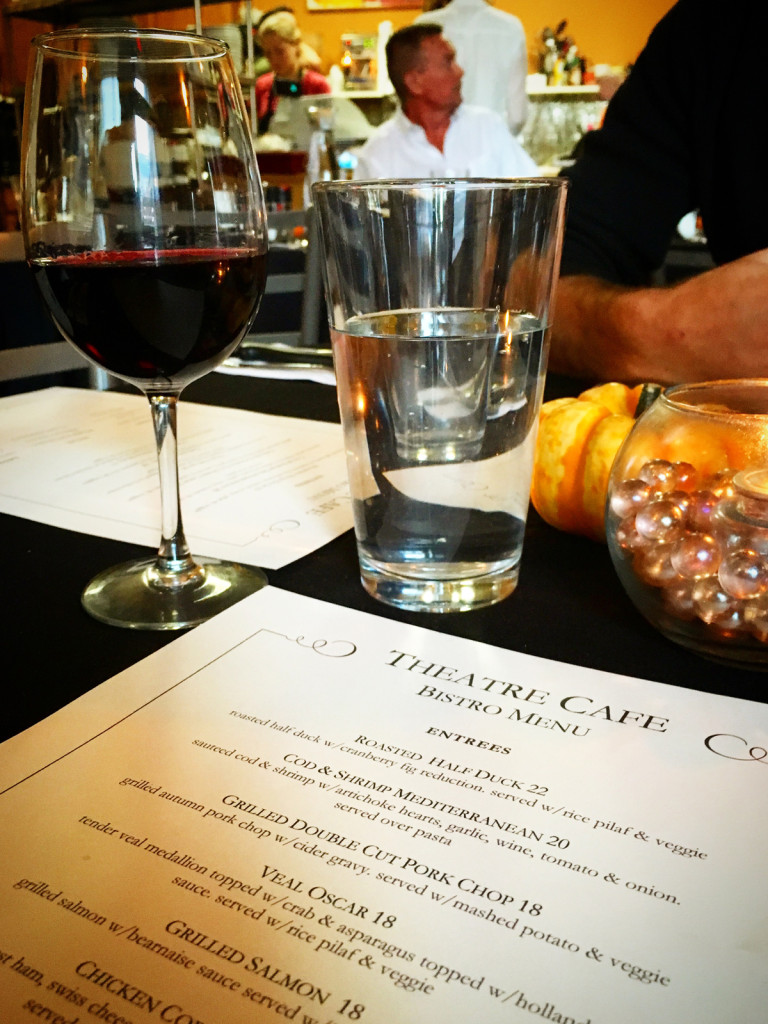
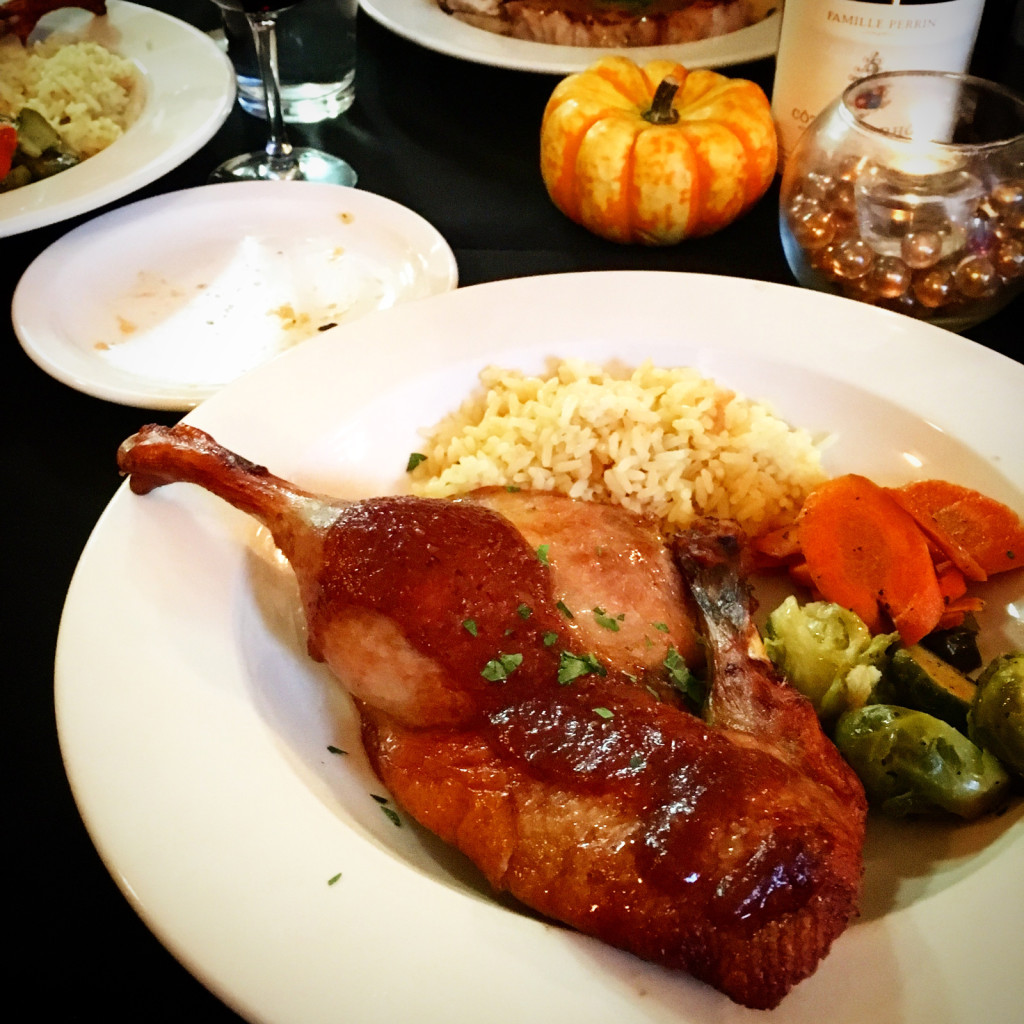
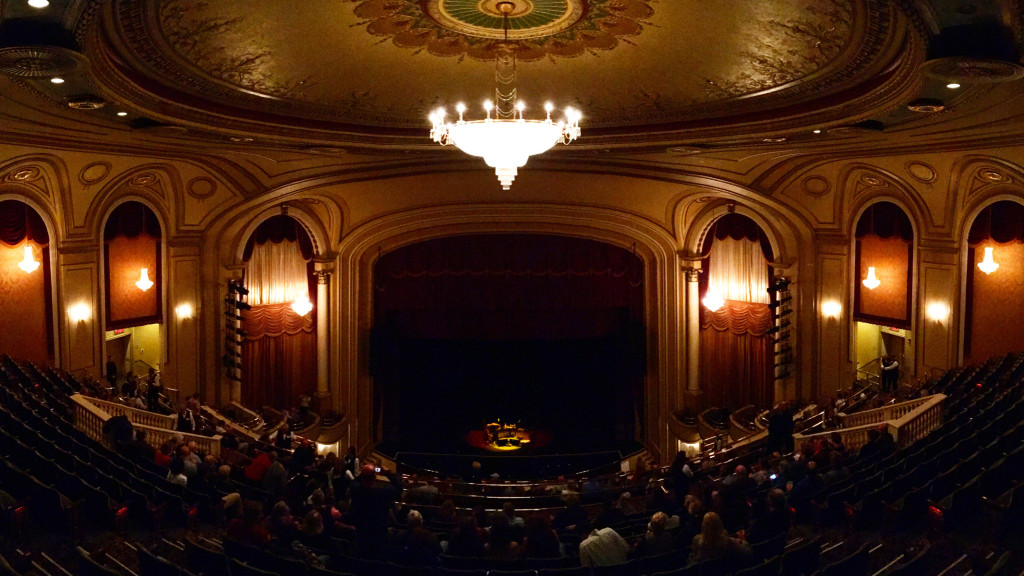
* * *
Another gloriously gorgeous autumn day arrived. Rain was expected on the following day, so I was determined to stretch my legs on one more vigorous stroll through downtown Worcester.
The temperature read 61 Fahrenheit, but the bright sun brought on a mild sweat as I walked up and down the hilly streets. People on errands and lunch breaks walked briskly to their destinations, and the streets held steady traffic. The sky was so blue.
I, too, was on the prowl for lunch. As I meandered downtown on foot, all sorts of smells and sights tempted me. The heavenly fried grease from a soul food joint. A bright, yellow sign spelling out “Great Wall” hawked Chinese fare. The lovely Theatre Cafe from the evening prior was open, too.
But in front of the Registry of Motor Vehicles was parked a tiny, motorized cart — the kind custodians and maintenance staff use to drive from building to building on office or school campuses. A hand-painted sign on the cart door read: Ray’s Hot Dog.
I have a hard time passing up lunch carts with this kind of character. I walked around the block one more time, but finally succumbed to my inner peer pressure.
A few folks were gathered at entrance of the R.M.V., but no one was in line. When I walked up to the cart, the hot dog man was fumbling at something inside his driver’s cabin. I had to stand for a moment before he noticed me.
“Can I get two hot dogs with onions and relish, please? And a Coke?”
He nodded, and opened the cooler compartment to dig out a can of Coca-Cola. His searingly red apron matched his black-and-red Red Sox ballcap.
“Everybody’s the same,” he said to me, out of the blue.
“Excuse me?”
“Dat lady over there, she said everybody is different. But everybody’s the same, you know?”
I had heard someone muttering a conversation behind me while I was waiting, but didn’t catch what he or she had said.
“I agree” was all I could reply.
“You can be black, or brown, or yellow. Or blue.” The hot dog man laughed at himself with the “blue” quip. His accent was thick, and hard to place. Pointing to his chest, he continued. “But inside, our blood is all the same, you know?”
“That’s true,” I offered. “The more people you meet, the more you realize everybody is the same.”
“Eessactly. We are all the same.”
We both smiled.
The first hot dog was ready. He first smothered a bun in finely chopped onions and relish, then placed a steamed frank atop the condiments. It was set upon a napkin. The wind was blowing things around a bit.
The hot dog man paused, as if he forgot something. He looked back at the first dog to inspect it, and said something I couldn’t understand. Venturing a guess, I said, yes, both with relish and onions, please.
That was the right answer. The hot dog man went back into hot dog mode.
“Sorry my mind is…is distracted,” his mustache fluttered to find the words. “I haff dis S.U.V. at home I’m fixing.”
I couldn’t completely understand what he said next. It sounded like he had to take the muffler out, but then he also had to lift the whole engine out. It sounded like hard work.
“You should get a friend to help.”
“No friend. I have one friend,” he said, pointing up to the brilliant, blue sky. “I have God.”
“That’s right. We’ve all got at least one friend.”
The hot dog man smiled. The second hot dog was now ready, resting on its napkin. I gently applied a line of ketchup and yellow mustard on each. The wind promptly blew a napkin edge into the puddle of condiments. I was going to make a mess carrying these two dogs away from the cart.
“You want a plate?”
I said sure, and started to take my phone out to take a photo of the humble pair of dogs.
“I’m going to make all of my friends jealous,” I said. “So are you Ray?”
“Yes.”
“I’m going to enjoy these hot dogs, Ray. Thank you so much.”
I moved aside, and let Ray tend to his next customer, who spoke in rapid Spanish.
I retreated back to a concrete bench in front of the R.M.V. to enjoy my hot dogs. As I basked under the precious October sun, I watched people come in and out of the building doors. Staff came out for fleeting cigarette breaks, while the public — of all shapes, stripes, ages, ethnicities, and dress — went about their business inside.
If there’s one place in the world where everybody’s all the same, a motor vehicles license office is certainly it.
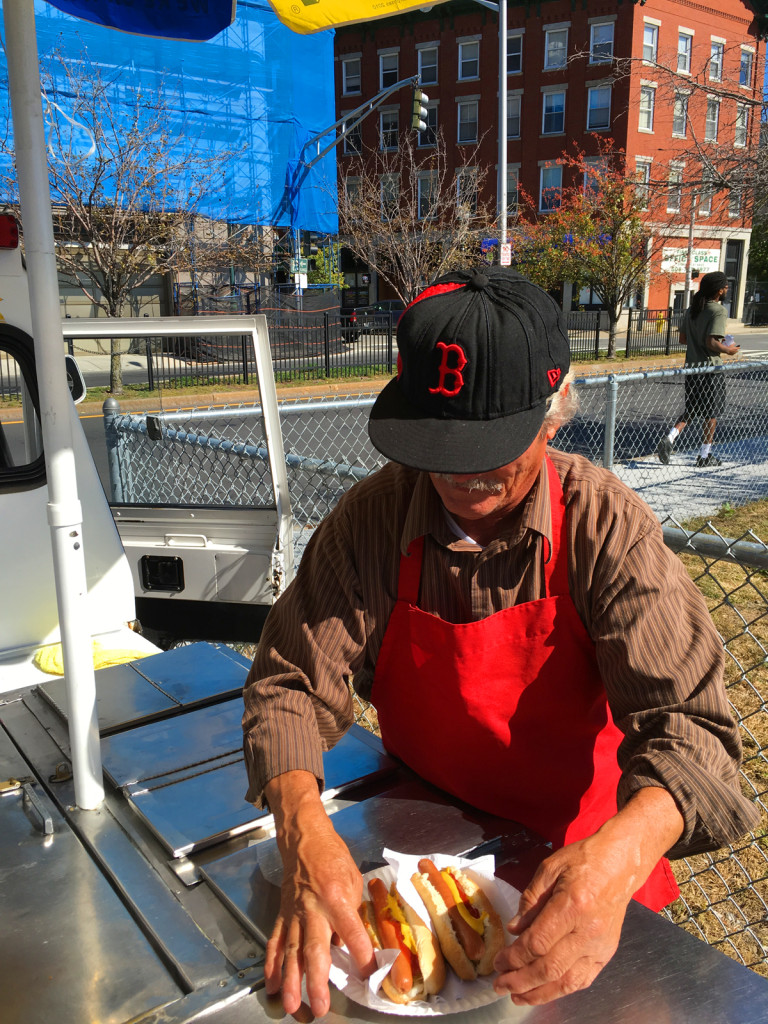
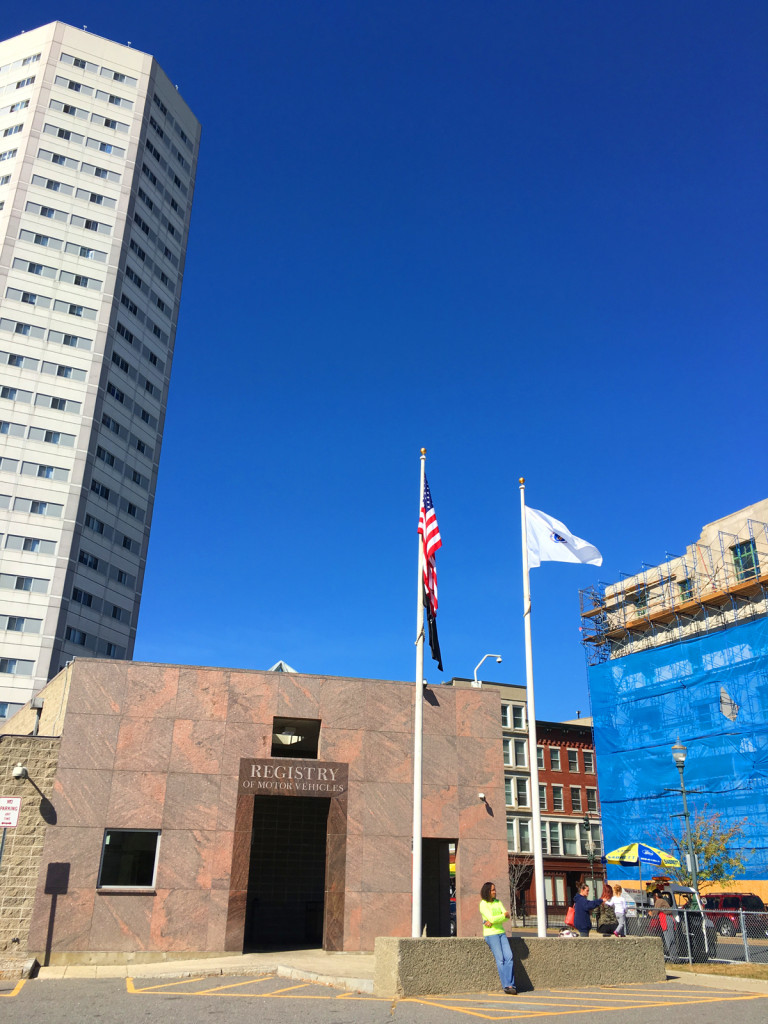
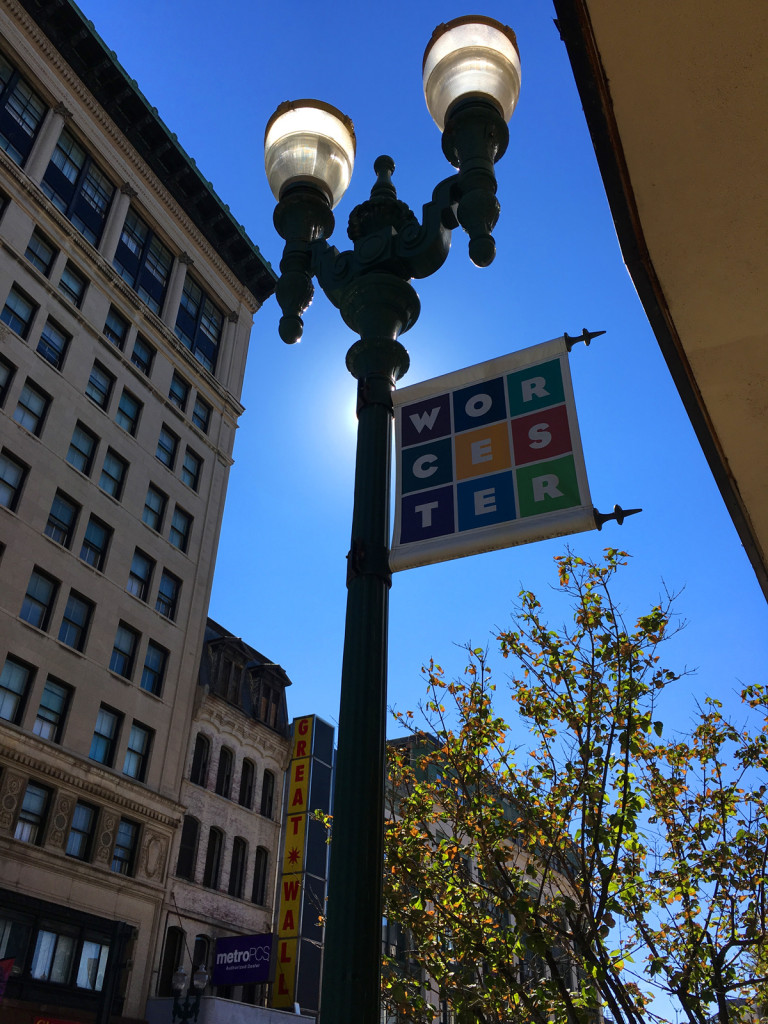
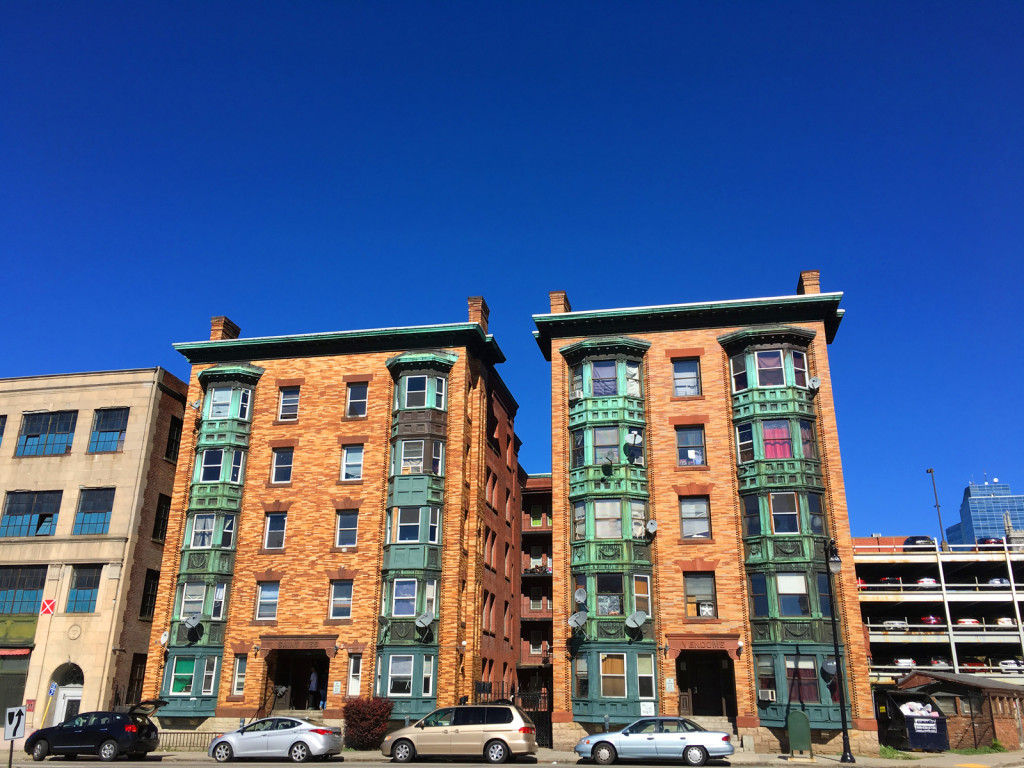
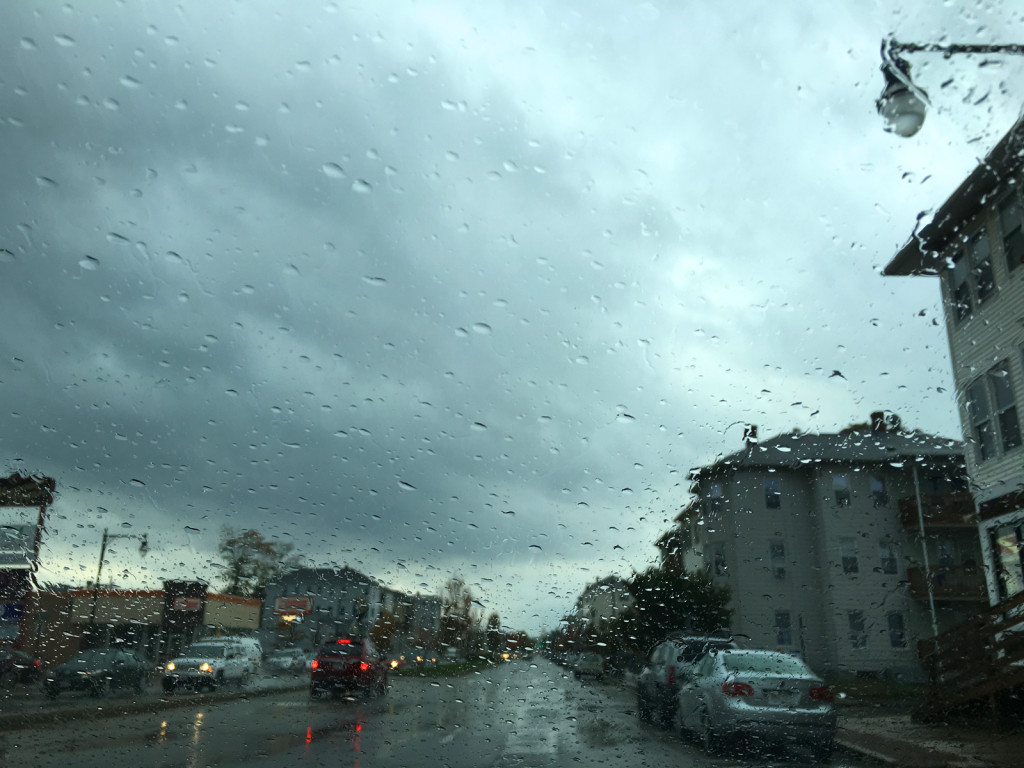
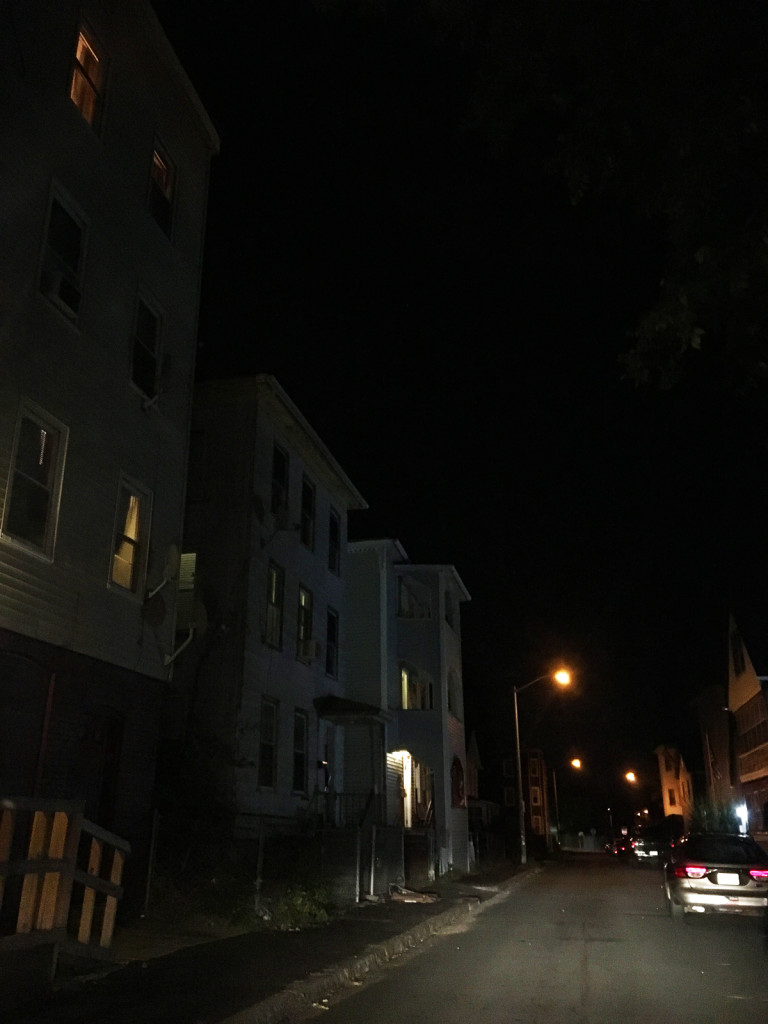
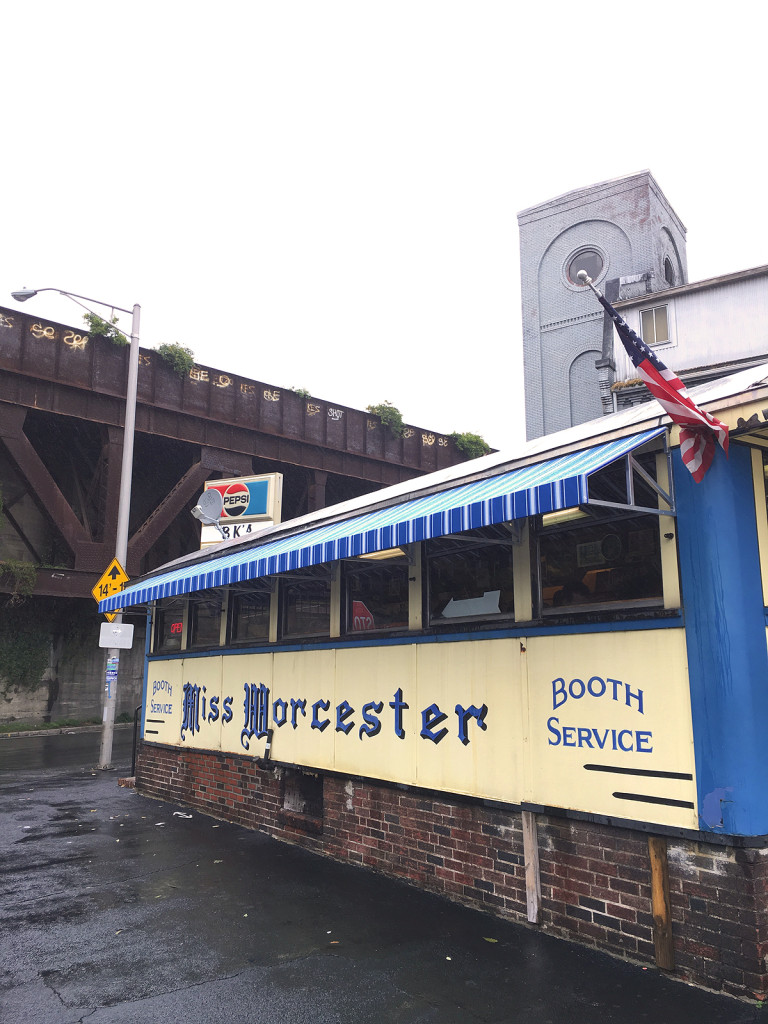
VISIT:
Pickle Barrel Restaurant & Deli
305 Pleasant Street
Worcester, Massachusetts 01602
USA
1 508 754 0921
Find on Google Maps
Theatre Cafe
529 Main Street
Worcester, Massachusetts 01608
USA
1 508 799 7190
Find on Google Maps
Ray’s Hot Dog
(Registry of Motor Vehicles)
611 Main Street
Worcester, Massachusetts 01608
USA
Find on Google Maps
CREDITS:
Story: Ben Young Landis
Photography: Ben Young Landis
